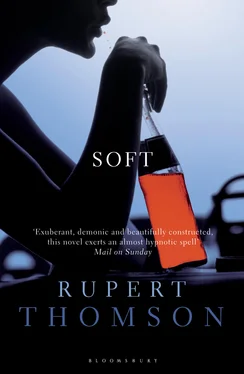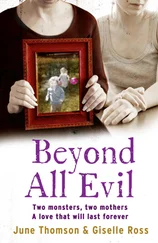He tore the cellophane packet open and peered inside. That man he’d seen a month ago, with the Maltesers, the secretaries on the tube … and now this so-called ROBOT JELLY. An idea was beginning to take shape. In some quite physical sense, he felt he was being nudged. Or prompted. He looked up. Zane was staring at him, a cigarette halfway to his lips.
‘It’s all right,’ Zane said. ‘You don’t have to eat them.’
When Jimmy woke up the next morning, he saw eight gnomes standing on a patch of Astroturf outside his bedroom window. Eyes half-closed, head pounding, he counted them again. Yes, eight. His upstairs neighbour, Mrs Fandle, must have bought a new one. Jimmy lived in what estate agents call ‘a ground-floor-and-basement maisonette’. If you stood in his bedroom, which was at the back of the house, and looked through the window, you had a view of the terrace belonging to the flat above — but your eyes were on a level with the floor, with the Astroturf itself. In the summer Jimmy would sometimes wake to see a deckchair just a few feet from his head, the stripy fabric straining under the weight of Mrs Fandle’s body, her bare legs white and veined and monumental. Luckily it was October now, and the temperature had plummeted. He only had the gnomes to deal with — though, seen from below, they could seem imposing, sinister, like highway sculpture in America. Once, not long after moving in, he dreamed the gnomes had taken over. In his dream, of course, they’d multiplied. He found them in the hall, on the sofa, halfway up the stairs. One was lying on his back under the grill, like someone in a tanning centre. When he opened the fridge, two of them were standing on the inside of the door, the place where you keep juice and milk. They were everywhere he looked. It had been a kind of nightmare.
Dehydrated but incapable of moving, he dozed on, imagining the cold tap running, ice-cubes jingling in frosted pints of water. Waking again, he reached for the glass beside the bed. Though he could see that it was empty, he brought it to his mouth and tipped it almost upside-down, thinking he might find one drop of precious liquid at the bottom. But no, nothing: he must have drained it during the night. His head ached terribly — a soft, dull thudding; he saw bags of sand being dumped one after another on to a road. On top of that, there was an unpleasant padded feeling, a kind of claustrophobia. He felt as if his brain had been packed in cotton wool. As if it was about to be sent somewhere by post. FRAGILE stencilled on the front in red. THIS SIDE UP. He put his feet on the floor. Sat still for a moment, forearms on his knees, head lowered. Probably he shouldn’t have taken the Temazepam, not after all that vodka and champagne. And probably the E hadn’t helped. Parties.
He struggled to his feet and walked unsteadily out of the bedroom and down the half-flight of stairs into his living-room. Thinking he might like some air, he slid the picture-window open. The smell of lavender drifted in from the small, walled garden. He was almost sick. Turning away from the window, he passed through a narrow doorway to his right. He stood at the wash-basin in the bathroom, staring at his image in the mirror, the whites of his eyes gelatinous, like the transparent parts of eggs. His face slid off the mirror as he opened the medicine cabinet. He scoured the shelves, hands moving clumsily. There was a choice. Solpadeine, Paracodol and one dog-eared box of something left over from a holiday in Thailand. He chose the Paracodol. Down in the kitchen he opened the fridge and lifted out a can of Kwench!. American import, still unavailable in the UK. Swallowing two pills, he drank the contents of the can, then climbed the stairs back to the bathroom and took a shower.
Later, when the pounding in his head had faded, he sat in the living-room, a cup of coffee on his lap. Saturday TV flickered mutely in the corner of the room. Outside, in the garden, the bleak sunshine silvered half a tree-trunk, one narrow strip of grass. He found the packet of sweets Zane had given him and emptied it on to the table. The robots were the curious, translucent red of human skin three layers down. Something Connor had said in a meeting the day before came back to him. The objective of advertising is to change the behaviour of the consumer so they purchase more of the product . Connor had been stating the obvious, of course, but it was strange, wasn’t it, how things could suddenly become obscure when they were put into words. The more Jimmy thought about it, the more the sentence seemed to gather meanings. He began to arrange the robots in fighting formation. Unusual smell, they had. Like certain kinds of plastic. Like toys. What Connor had said, though. The words that almost swaggered in the middle of that simple sentence. Change the behaviour . The dark-haired secretary on the tube, the small red figures lined up on the table. There was a connection there, a hint. An opportunity. Jimmy sat back, staring at the wall. Outside, the sunlight faded and the room darkened in an instant, as if a cloth had been thrown over the house. The route his thoughts were taking now was unpremeditated, shocking, but he felt he was seeing with absolute clarity. Maybe it would be impossible to implement. And yet, if he could do it. If it could be done …
He snatched up his keys and his ECSC ID, and left the flat. On his way up Mornington Terrace he passed a house with four motor bikes and an overturned dustbin in its front garden: Hendrix’s ‘Voodoo Chile’ churned and howled from an open window on the second floor. He walked on. The clicking of a train as it slid lazily into Euston or King’s Cross, the same sound as someone running down a flight of stairs: two clicks, a gap, two clicks, a gap … He reached his car, an MG Midget, almost twenty-two years old. He didn’t usually give names to things. In this case, however, with a number-plate like YYY 296, he hadn’t been able to resist. Delilah started fourth time, as always. Jimmy turned left, over the railway, and followed the northern edge of Regent’s Park. At Paddington, he joined the Westway, that casual, delicious curve of motorway that led to the White City exit. The closest thing London had to a piece of race-track. It was here that he’d once got up to 93 m.p.h. in Marco’s Triumph Herald. Where was Marco, anyway? He hadn’t heard from him for days. He reached the office in twenty minutes and parked on a single yellow line. Bob stood on the pavement outside the building, rocking gently on his heels, his hands thrust deep into his trouser pockets.
‘Not like you, coming in on a Saturday.’ Bob’s oblong head wobbled on his neck, a sure sign that a joke was on its way. ‘Haven’t you got nothing better to do?’
‘Did it last night, Bob,’ Jimmy said, and winked. He hadn’t, though. Hadn’t done it for about three weeks.
Bob chuckled.
Jimmy couldn’t resist telling Bob why he’d come in. ‘I’ve had an idea, you see.’
‘An idea, eh?’ Bob looked away into the sky, his face vague and peaceful, utterly unthreatened. I’ve just been to Venus would have elicited the same reaction. Venus, eh?
For the next three hours Jimmy worked on his proposal. It would be a tactical document, he decided, since the budgetary implications of his plan were still unknown. Every now and then he left his desk and walked to the window. To the north the sky had darkened, blurred. Rain would be falling in Cricklewood, in Willesden Green. Once, while he was standing at the window, staring out, he heard a voice behind him call his name. He looked over his shoulder. Debbie Groil stood ten feet away, her arms folded across her breasts, as if she was feeling cold.
Debbie worked in Communications. Earlier in the year, while they were attending a sales conference in Leeds, she had invited herself up to his room at one in the morning. He remembered how she lay across his bed, four buttons on her blouse undone, pretending to be drunk. Haven’t you got nothing better to do?
Читать дальше












